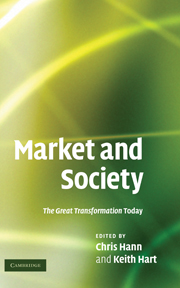Book contents
- Frontmatter
- Contents
- List of figures and table
- List of contributors
- 1 Introduction: Learning from Polanyi 1
- 2 Necessity or contingency: Mutuality and market
- 3 The great transformation of embeddedness: Karl Polanyi and the new economic sociology
- 4 The critique of the economic point of view: Karl Polanyi and the Durkheimians
- 5 Toward an alternative economy: Reconsidering the market, money, and value
- 6 Money in the making of world society
- 7 Debt, violence, and impersonal markets: Polanyian meditations
- 8 Whatever happened to householding?
- 9 Contesting The Great Transformation: Work in comparative perspective
- 10 “Sociological Marxism” in central India: Polanyi, Gramsci, and the case of the unions
- 11 Composites, fictions, and risk: toward an ethnography of price
- 12 Illusions of freedom: Polanyi and the third sector
- 13 Market and economy in environmental conservation in Jamaica
- 14 Embedded socialism? Land, labor, and money in eastern Xinjiang
- 15 Afterword: Learning from Polanyi 2
- Bibliography
- Index
2 - Necessity or contingency: Mutuality and market
Published online by Cambridge University Press: 08 August 2009
- Frontmatter
- Contents
- List of figures and table
- List of contributors
- 1 Introduction: Learning from Polanyi 1
- 2 Necessity or contingency: Mutuality and market
- 3 The great transformation of embeddedness: Karl Polanyi and the new economic sociology
- 4 The critique of the economic point of view: Karl Polanyi and the Durkheimians
- 5 Toward an alternative economy: Reconsidering the market, money, and value
- 6 Money in the making of world society
- 7 Debt, violence, and impersonal markets: Polanyian meditations
- 8 Whatever happened to householding?
- 9 Contesting The Great Transformation: Work in comparative perspective
- 10 “Sociological Marxism” in central India: Polanyi, Gramsci, and the case of the unions
- 11 Composites, fictions, and risk: toward an ethnography of price
- 12 Illusions of freedom: Polanyi and the third sector
- 13 Market and economy in environmental conservation in Jamaica
- 14 Embedded socialism? Land, labor, and money in eastern Xinjiang
- 15 Afterword: Learning from Polanyi 2
- Bibliography
- Index
Summary
Karl Polanyi bequeathed to anthropology the concept of the embedded economy. First developed in his book, The Great Transformation (1944), to describe the transition from “pre-industrial” to industrial life, Polanyi subsequently used the idea of embeddedness to understand ethnographic (“primitive”) and historical (“archaic”) economies. In the ethnographic cases, reciprocity is the predominant transaction mode; in the historical contexts, redistribution primarily governs the transaction types. In modern societies, however, disembedded markets dominate transactions. Despite his earlier historical presentation, Polanyi offered a static typology of economies that has usually been set within a binary opposition: either material life is embedded within social relationships or it is disembedded as anonymous exchanges. For Polanyi, the historical reversal of the necessary (society) and the contingent (the market), which occurred with the emergence of industrial society, was a one-time event that was accomplished at great human cost. Granovetter (1985) modified the stark opposition by observing that many economies are more embedded than economists perceive, whereas material life is more disembedded than anthropologists allow. But neither he nor Polanyi developed the theme that the embedded/disembedded pair or mutuality and market, make up the dialectic in economy.
In contrast to Polanyi, a neoclassical economist might argue that real markets sometimes include mutual commitments, but these ties are imperfections in an ideal model. To the extent that personal relationships, misperceptions, emotions, and imperfect information influence price-setting, markets are less efficient than they might be and mutuality ought to be eliminated.
- Type
- Chapter
- Information
- Market and SocietyThe Great Transformation Today, pp. 17 - 37Publisher: Cambridge University PressPrint publication year: 2009
- 22
- Cited by



